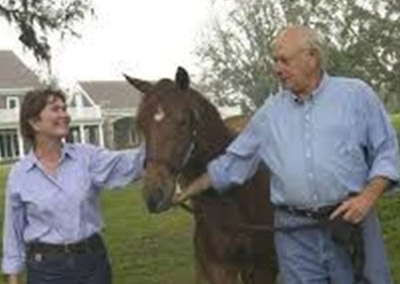Bruce and Judith Brunson
Ironwood Farm

Welcome to Ironwood Farm, a 120-acre haven, 10 miles northwest of Ocala. Owned by Bruce and Judith Brunson, the farm takes its name from ironwood trees, also known as American hornbeam, which grow throughout the property. The approach to the farm is through a large gate. As you follow the gently curved drive, the serene beauty of Ironwood unfolds before you.
Miles of well-kept, four-board fence surround the pastures and rolling Bahia grass hillsides. Riding trails wind along the meandering perimeter of Ironwood Farm, around clear ponds, under reaching branches of ancient live oaks and along acres newly planted fields.
Previous owners had logged a large portion of the property, and the Brunson’s are committed to restoring their property to its original ecological balance. They have reforested with more than 2,000 shrubs and trees, all native to Ocala, including; live oak, loblolly pine, slash pine, wax myrtle, cypress, and magnolia.
The pond in the restoration area is stocked with largemouth bass, Florida brim, and catfish, which are thriving. A handful of food pellets tossed into the pond coaxes the fish to the surface. The water darkens and roils as hordes of catfish vie for food in a riotous feeding frenzy.
Due to the Brunson’s conservation efforts, wildlife has also returned to the farm. With deserved pride, Judith tells of red-tailed hawks, and kites, which have made the tall cypress along the edge of the pond their new habitat. We scan the sky hoping for a glimpse of the pair of bald eagles, which have also nested in the area.
As the natural habitat for Florida quail rapidly disappears due to development, the skittish little birds are becoming scarce as well. Plantings at Ironwood include native berries, shrubbery, and underbrush in which the birds can hide. The Brunson’s rigorous efforts are rewarded with the recent sighting of several pair of quail – their young offspring waddling close behind.
A walk through the restored acres proves that the Brunson’s costly and time-consuming campaign to restore the land to its natural state is an enormous success. Purple martins soar around their multi-compartmented houses, built to encourage the birds to nest as a natural solution to mosquitoes. The immense canopy of centuries-old live oaks provide shade to the tender growth on newly planted trees, and a profusion of white flowers on raspberry and blackberry bushes, promises a bounty of berries to feed the wildlife.
This pastoral farm is also home for 24 Missouri Fox Trotter horses – including seven mares, 10 yearlings and geldings, and six foals. The three large barns on the property have state-of-the-art amenities including a computer room, several well-equipped tack rooms, birthing stalls, washing areas, and automatic waterers. Oversized fans on the vaulted ceilings keep the Florida heat to a minimum and the comfort of the Fox Trotters to a maximum.
One of only a few American breeds, the Fox Trotter is famous for its unique four-beat diagonal gait, which delivers the Rolls Royce of trail rides, perfect for both the novice and experienced rider. What cinched Judith and Bruce’s decision to raise and sell Fox Trotters however, was the incredibly gentle disposition and elegant confirmation of the breed.
“They are calm and affectionate animals, I call them the ‘golden retriever of horses’,” Judith told us.
